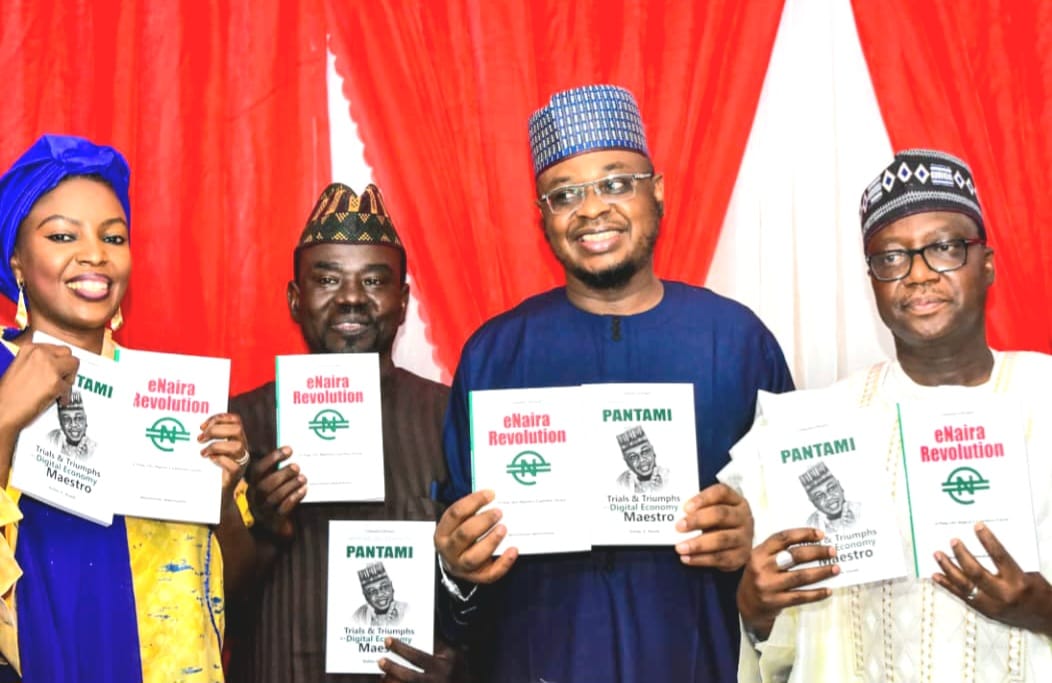The book on Pantami’s trials and triumphs
By Jaafar Jaafar I was delighted when my big brother, Mallam Yushau Shuaib – a cerebral PR expert, writer and publisher of PRNigeria and Economic Confidential – visited my family recently in London and requested that I write a review on his new book “Pantami: Trials and Triumphs of a Digital Economy Maestro.” While I […]

By Jaafar Jaafar
I was delighted when my big brother, Mallam Yushau Shuaib – a cerebral PR expert, writer and publisher of PRNigeria and Economic Confidential – visited my family recently in London and requested that I write a review on his new book “Pantami: Trials and Triumphs of a Digital Economy Maestro.”
While I viewed his request as a special honour, the short notice gave me a little concern. But being my benefactor, mentor and caring brother of nearly two decades, I had no option but to accede to his request. From the book cover, one could read the short blurb by Professor Adeola Akande, Chairman, Board of Commissioners of the Nigeria Communication Commission (NCC).
“Much more than just being a chronicle of the vicissitudes of a respected scholar of the digital experience and faith, it is a testament to a crucial period in the life of a country,” he said. The chairman’s brief set the stage for what readers should expect inside the revelatory contents of Yushau’s blockbuster, non-literary piece.
In the book’s Chapter One titled: Personal Opinion, the author provides his previously published articles on the Minister of Communications and Digital Economy such as That Friendly Call from the Scholar; The Memorable Visit for Digital Innovation; Authority on Cybersecurity and Datafication and Encounter with a Digital Economy Maestro.
3.8m cyberattacks launched during guber, state assembly polls-Pantami
FG, UNDP, Japan to tackle piracy in Nigeria, Gulf of Guinea
The second Chapter is titled Inter-Agency Engagements, with topics that actually address certain inter-agency rivalries. They include Resisting Multiple Telecom Taxation, The NIN-SIM Linkage Palaver, and The War on Stamp Duty.
Chapter Three, on Managing External Factors, illustrated major battles or challenges Profesor Pantami had to contend with during his tenure in office as the Minister. The topics are ASUU Battle over IPPIS-UTAS Payment System; On FUTO Professorship and Witch-Hunting or Boko Haram Saga?
Operational Exigencies is the title of the Chapter Four of Yushau’s latest publication, and therein one will find the following articles: NigComsat and the Fear of Privatisation; The Galaxy and Visibility and Record of Accomplishments.
Most of the topics revolve around mandates and activities of agencies under the Communications and Digital Economy Ministry: the NCC, National Information Technology Development Agency (NITDA), Galaxy Backbone Limited, Nigerian Communications Satellite Limited (NIGCOMSAT), National Identity Management Commission, (NIMC), and Nigeria Postal Service (NIPOST).
I found some of the topics very interesting and intriguing. The author narrates how a very long ASUU strike was influenced over a disagreement on the payment system for universities’ lecturers, among others, as well as Pantami’s feats as Communication and Digital Economy Minister since 2019.
They include the implementation of broadband connectivity, reinvigorating the digital economy sub-sector, empowerment of citizens’ ICT skills, implementation of a Digital Identity Programme, implementation of a National Digital Economy Policy and Strategy, digitizing government functions and processes, and deployment of 4G nationwide.
The controversy over Pantami’s appointment as Professor of Cybersecurity at the Federal University of Technology Owerri (FUTO) and the debate on his link to Boko Haram terrorism many years ago were dispassionately analyzed. Yushau was very fair in his narrations, providing the genesis of the aforementioned thorny issues and how they all ended with the official’s triumph against his army of critics.
Using the Minister’s travails as a public office holder, the author observes that the media are generally more inclined to celebrating conflict and crisis, even as they also, deliberately – and rather unfortunately – censor other crucial sides to stories that could temper the public drift towards hysteria.
Due to admiration for Pantami’s erudition in both Islamic and Western education, I was appalled by the dispute that trailed his elevation to the rank of Professor. As someone who detests being addressed as “Sheikh” to demonstrate pedagogical humility, I expect him to, in the like manner, throw away the pulpy endocarp of the mango in order to get rid of the flies.
Indeed, I share the sentiment expressed by Yushau that Pantami, to some extent, triumphed over the endless trials, travails and tribulations that threatened his ministerial and professorial appointments.
As the fireworks intensified and the controversies raged such that the presidency was forced to take positions on some of the issues, one of the hidden facts, that is not stated in this book was that the author sat with ‘top commanders’ in his bunker in the Wuye area of Abuja.
The PR warlord deployed his arsenals strategically and fired from the cylinders of traditional and new media with remarkable marksmanship. At the end of the day, the warfare paid up. The rest are now history.
I think one day, I will also write a book titled “An Encounter With A Spin-Master” in honour of Yushau’s outstanding PR feats, just the way he authored “An Encounter With A Spymaster” in honor of Colonel Sambo Dasuki’s feats in espionage and military intelligence.
In conclusion, I recommend this latest edifying and intellectually stimulating book to media practitioners, students, communication experts and players in digital innovation and ICT, among others. PR managers, in particular, will also find the book relevant in learning the ropes of solving dire image crises.
Jaafar Jaafar, Publisher of Daily Nigerian, writes from London, United Kingdom
